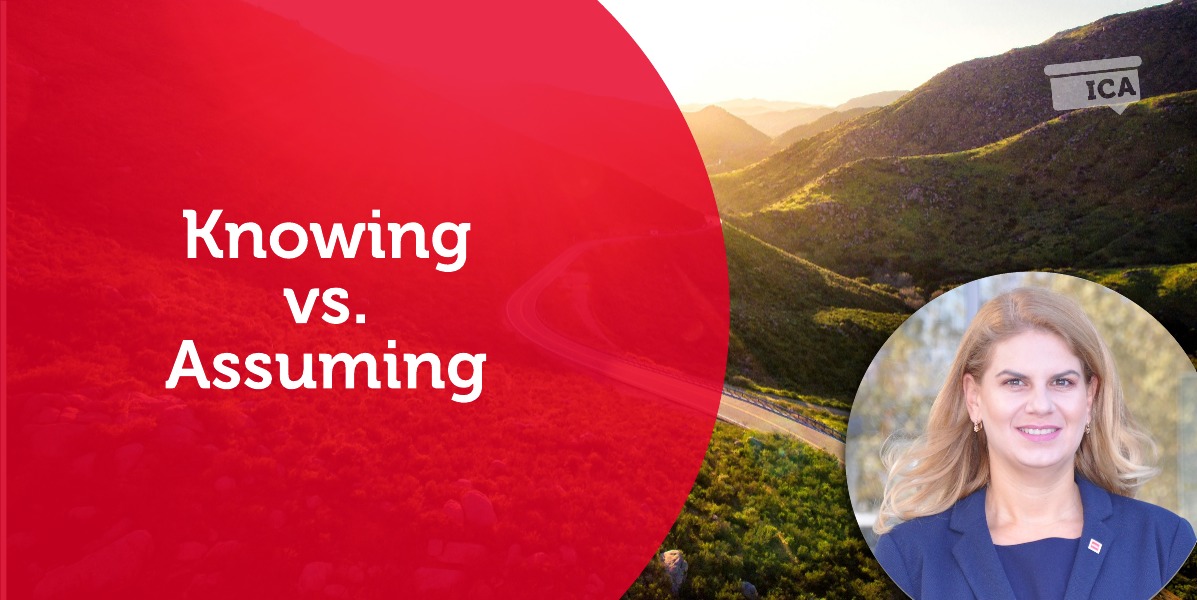A Coaching Power Tool Created by Cristina Gutu
(Business/Career Coach, ROMANIA)
According to Cambridge Dictionary:
To assume = to accept something to be true without question or proof
To know = to have information in your mind; to be certain; to be familiar with or have experience and understanding of
In my research paper, I have discussed the fundamental importance of self-awareness in the coaching process.
My power tools explore the topic further by putting in contrast two concepts: Knowing vs. Assuming
Making assumptions creates obstacles to your journey towards growth and success. Sarah Blick (career & life coach) explores the 9 Reasons Why Making Assumptions is Dangerous in one of her articles. I found several of them very useful both for my reflections and also for the coaching conversations I have with my clients. For example:
How you as a coach can help your clients live a life beyond assumptions that will allow them to grow? By asking lots of powerful questions that will enable them to see a clear picture in the mirror. Being able to ask the right question at the right time is one of the key skills in coaching. This is because a relevant question enables the client to stop making assumptions, think from a different perspective, and triggers a new awareness.
Through my coaching journey, I found out the importance of underlying believes and why it is important to become self-aware of them to be able to overcome them. They are nothing else than another form of making assumptions. These beliefs are ideas, thoughts, and assumptions we perceive as absolute truths. They are emotional and psychological and often irrational. They are formed through our experiences and interactions with the world and make up our mental model.
Self-awareness is the first step to understanding what lays below the surface. It is the conscious observation of the way we think and act. Such awareness opens up an opportunity to see what the core beliefs are that drive your actions. It is like the onion metaphor described by Travis Bradberry & Jean Greaves in their Emotional Intelligence 2.0: “Getting to know yourself inside and out is a continuous journey of peeling back the layers of the onion and becoming more and more comfortable with what is in the middle – the true essence of you”.
The coach’s role is to empower their clients to name their own Underlying Beliefs. It is very hard to address something when it is not visible and clear. However, by detecting an Underlying Belief, and facing it head-on, it becomes possible for us to change behavior.
The following question may help the coach to encourage clients to obtain a better understanding of their own Underlying Beliefs:
What belief, opinion, or judgment could you be reinforcing by constantly creating this outcome?
Lion Goodman, PCC, in his article posted on the ICF website considers that If coaches could help their clients change their beliefs that are driving their misconceptions and unproductive behavior patterns, they could create the substantial, long-lasting transformation they are looking for. He continues by presenting some powerful questions you can ask that foster self-inquiry and further exploration:
Lion then concludes that “When your client changes their beliefs, their perspective changes, and so does their world. When you evoke change at that level of the psyche, you become a powerful agent of change—a more masterful coach”
This article has been a true eye-opener in my coaching journey as it made me realize what is the starting point for a truly effective coaching process.
So, how can you support the clients in their journeys from assuming to knowing?
Maybe the most powerful tool you can use to challenge the clients and to change their beliefs is to ask them to gather feedback, opinions of people they trust and respect about these limiting assumptions.
Using observation, powerful questions and feedback allow the coach to approach a client’s underlying beliefs from a range of different angles, rather than seeing it as something that the client can simply choose to quickly change. By providing this space, and respecting the complexity of the client’s journey, the coach allows the client to make real breakthroughs and achieve sustainable change.
References:
https://dictionary.cambridge.org
ICA learning support documents
Sarah Blick(Career & Life Coach) article – 9 Reasons Why Making Assumptions is Dangerous (https://medium.com/thrive-global/9-reasons-why-making-assumptions-is-dangerous-345e8b24008c)
Bradberry, Travis; Greaves, Jean; Lencioni, Patrick (2009) Emotional Intelligence 2.0
https://coachfederation.org/blog/how-to-find-and-clear-core-beliefs
